
Alan Fowler
Local writer and storyteller, George Murphy interviews local characters and personalities. More HebWeb interviews
Introduction
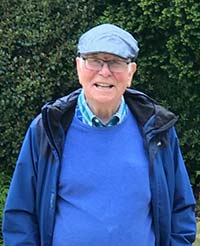 George Murphy met with Old Town historian Alan Fowler and asked him about his early years, confrontations with the law, walking out on Bob Dylan, fear of flying and much more.
George Murphy met with Old Town historian Alan Fowler and asked him about his early years, confrontations with the law, walking out on Bob Dylan, fear of flying and much more.
Alan Fowler was at the London School of Economics at the time of 1960s student unrest and taught Economic History at Manchester Metropolitan University with a particular interest in the history of the cotton operatives and their trade unions
Read below Alan's reponses to George's questions.
ALAN FOWLER ANSWERS THE HEBWEB Q&A
Alan, can you tell us about your early years?
I grew up in South Manchester on the borders of Withington and Didsbury near Fog Lane park. I was born in September 1944 and the only ever street party I have attended, though I have no memory of it, was for VE Day.
When, in the summer of 1945, one of the three American soldiers who had been billeted at our house prior to D Day returned to visit my parents he found me, a new arrival, and bought me my first Teddy Bear! Given the origins of the name Teddy Bear I have always liked this story.
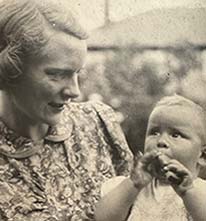
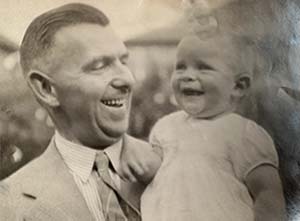
I am adopted and my mother came from Hull to give birth to me. I was adopted a few weeks later by my mum and dad. I have always known I was adopted. After my parents died, I did try and get in touch with my mother, but she did not want to meet me. I sent her a message to say that my adoption had been a success.
How was your schooling?
I went to Beaver Road School and, after passing my 11 plus, Chorlton Grammar School. However, I only passed after taking it twice, as being born in September gave you this enormous advantage. I can still remember the sense of disappointment and failure the first time I took it and failed. I enjoyed my primary school and played in goal for the school. I changed to cross country running at secondary school and ran for Manchester Schools.
Have you always wanted to be a historian?
I developed an interest in History in primary school, and History became the subject I was most passionate about, visiting castles with my parents when we took holidays in North Wales. At secondary school, it was the one subject I was good at and the History teacher used to call me professor!
I feel very grateful to my parents because they had one ambition above all else, for me to go to university. It was this ambition that was one of the most important influences on my life. My dad had been offered a place at Manchester University in 1929 after he had completed his apprenticeship at Mather and Platt and been awarded an associate in mechanical engineering at Manchester College of Technology (later UMIST). However, his father discouraged him from taking it.
My father always regretted not going to university, hence his ambition for me which was shared by my mum. She had met my dad at Mather and Platt where she was a secretary. My mum had to leave work when she married my dad in 1938 because the firm did not employ married women, a practice shared by many employers.
By a circuitous route, you ended up at The London School of Economics?
I had a rather mixed experience at grammar school and did not do well at A level, only passing History. I went to Hull Teacher Training College but left after a year to retake my A levels at Manchester College of Commerce where I discovered Economic History. My teacher was a well-known Economic Historian, R S Fitton and, after successfully completing my A levels, I continued at the college taking a London University degree. However, the college did not offer an option to specialise in Economic History so fortunately I was able to transfer to the LSE.
Were you a rebellious student in the 60s? Is that how you met your future wife, Lesley?
I arrived there in 1966 just as a major outbreak of student unrest occurred. When I began my studies, I also joined the LSE Socialist Society. This was the group that led the opposition to the appointment of Walter Adams as the new Director of the LSE which had been just announced. Adams had been the Principal of the University College in Southern Rhodesia which had made many compromises with the regime of Ian Smith. In our view, he was not the appropriate person to lead the LSE as he had not upheld the values that we felt the LSE stood for and were important in an international institution that upholds equality.
I was involved in the sit-in and other activities as we sought to persuade both fellow students and staff to oppose the appointment. Few of the staff supported us apart from Ralph Miliband and the Professor of Law whose daughter was a member of the Socialist Society. The Student Union did support us and the President, who was a former Manchester Grammar School pupil, was disciplined for his actions provoking further conflict. However, despite not being successful in our opposition to the appointment of Walter Adams, the Socialist Society decided to produce a pamphlet on our actions.
It was our choice of printer, Terry Chandler, which started another adventure. He was a leading figure in the Committee of 100, a peace group committed to direct action. He told us about the plans of the group to protest at the army coup in Greece which was designed to stop a general election in Greece which the army feared would result in a victory for the Left.
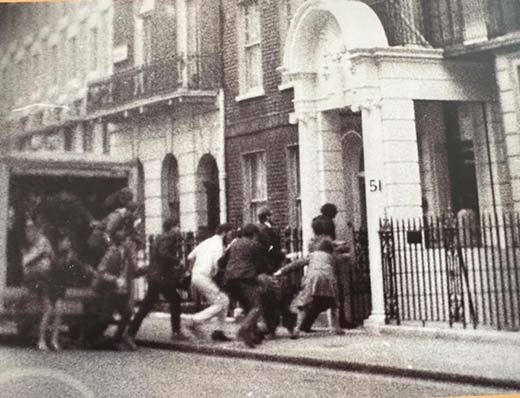
Greek Embassy occupation, 28 April 1967,
one week after the Colonels' coup in Greece
The Committee of 100 had close connection with the peace movement in Greece. This protest was to take the form of an 'invasion' of the Greek Embassy which we were told had the advantage that, as it was Greek territory, we could not be arrested! Thus, on April 28 1967 I was in a van being driven to the embassy while supporters called at the embassy with flowers pretending to be supporting the coup. To me it was reminiscent of the story of the 'Wooden Horse of Troy'. We arrived as the embassy doors were opened and rushed in! However, the embassy called the police who quickly arrived and arrested us.
We were taken to West End Police Station and spent the night there before spending three nights in Brixton Prison before being released on bail. After a period of bargaining with the prosecution we arrived in the autumn at the Old Bailey where we pleaded guilty. All the LSE students got off with what was in effect a warning as did many of the Committee of 100. There were 42 of us in the dock, a record. However, two people did get serious sentences, Terry Chandler and Mike Randle, who later worked at Bradford University Peace Studies. The difference in treatment left a sour taste. We had escaped lightly but some had paid a high price.
It was just prior to my appearance at the Old Bailey that I met Lesley. She was not impressed by my appearance in court because she thought I was daft to think I could not be arrested in the Greek Embassy. She worked above the room at Peace News where the Committee of 100 had plotted the invasion of the embassy.
Lesley was General Secretary of Youth CND when I met her. It was a chance meeting because we were both in Manchester that weekend. We met in the offices of the North West CND, an organisation which opposed nuclear weapons. I had been a member for some years. Lesley had come to Manchester to organise the leafleting of the Liberal Conference in Blackpool (September 1967). I was in Manchester telling my parents about my forthcoming trial at the Old Bailey and I agreed to help with the leafleting at the conference. We met again in London and our relationship grew steadily closer.
Back in Manchester you were filmed walking out of a Bob Dylan Concert at Free Trade Hall?
Before I went to the LSE I went to see Bob Dylan at the Free Trade Hall in Manchester in 1966, the famous concert that went down in history for the heckler who, disenchanted by Dylan's conversion to rock music, yelled 'Judas!' at him. Equally disenchanted, I left early after the start of the second half when Dylan introduced his electric guitar.
Leaving the concert, I was interviewed by a film crew who were following Dylan. I was very critical of Dylan in my comments but assumed, as the interviewers had American accents, that my comments would never surface; hence my surprise some 20+ years later when a clip from my interview appeared in the BBC series The Rock and Roll Years. My teaching colleagues threatened to show my students the clip but saved it for my retirement do! Let me just confirm that, despite rumours at the LSE, I was not the person who shouted 'Judas!'.
Lesley once told me that you were lucky in life because you soon got the job that you wanted?
Lesley's comment that I had the good luck to find the job I always wanted was absolutely on the button! When I was appointed to teach Economic History at the Manchester Polytechnic/ Manchester Metropolitan University I felt, to quote one of my colleagues, that "I had won the Pools". I loved both the teaching and the subject. I specialised in the history of the Manchester region with a particular interest in the history of the cotton operatives and their trade unions. I had some very good colleagues, and the students were always enthusiastic about the subject, especially our mature students who were outstanding. When I began researching my first cotton trade union in Manchester, the General Secretary greeted me with the sentence, "It was all Gandhi's fault!" (referring to the decline of the cotton industry). It was not but it made a memorable start to my research.
Let's pause and consider questions that readers suggested. Favourite book?
My favourite book, and the book that most influenced me as a student and still does, is Edward Thompson's The Making of the English Working Class written in Halifax and known throughout the world.
Reading my book gave me a fascination with the Calder Valley.
Favourite film?
Billy Liar. I think I went to see it six times. Many scenes were shot In Bradford.
Any hobbies?
I have always enjoyed walking, especially since I gave up cross country running. I have always enjoyed walking in the Pennines. However, my favourite walk is Wainwright's Coast to Coast.
Favourite Musician?
Bob Dylan - first half of the 1966 Free Trade Hall concert!
Historical Hero?
Alice Foley, the first women to be a full-time trade union official in the cotton industry. She wrote a lovely autobiography called A Bolton Childhood.
You're a non-flyer?
Very infrequent flyer!
I have not flown since 1956 when I flew from Manchester to Glasgow to see my two Scottish cousins one of whom is now the father of a film star.
I did get on an airplane with Lesley and the children in the 1980s, but like the Bob Dylan concert I left early, they had a very nice holiday in Greece! When I walked off the plane I was followed by one of the cabin crew who insisted I could not leave as the captain would be very upset.
I responded by saying, "F*** the Captain, I am not flying," and left.
The Captain, obviously worried about security, sent the member of the cabin crew to ask Lesley if I had packed the luggage. She gave one of her typical responses. "In twenty years of married life would I be so lucky?" This was all the reassurance the Captain needed, and he immediately took off.
Lesley did tell me that throughout the holiday, on the island of Crete, people greeted her with the sentence "Was it your husband?"
My favourite destinations are Glenfinnan and Loch Sheil in Scotland and Barmouth in Wales; they are both beautiful places where the mountains meet the sea and the loch.
Why did you come to live in Hebden Bridge?
We came to live in Hebden Bridge because Lesley started teaching at Bradford College, which is where you met her George. I taught in Manchester, so Hebden Bridge was a very convenient place for us. We caught the last years of the town as a textile town.
We had moved here from the Peak District, where we had lived in Hayfield and Edale, where we lived in a cotton mill, one of the first to be converted to flats. Edale Mill was known locally as the 'Kremlin' because the conversion of the mill, which was done by the Landmark Trust, had been initiated by Peter Jackson the former Labour MP for the High Peak, a good friend of mine! Since I married Lesley, I have always lived in buildings connected to the cotton industry.
When did you first become interested in mill poets?
I have written about Sam Fitton and also helped to organise exhibitions about him and his cartoons with my friend and former colleague Terry Wyke who also lives in Hebden. I came across the cartoons of Sam Fitton (1868-1923) in The Cotton Factory Times (1885-1937) which was the weekly paper of the Lancashire cotton operatives and their trade unions when I was doing research.
Sam Fitton also included a dialect poem with each cartoon. He drew cartoons for the paper between 1907 and 1918 and you can find these cartoons on the internet, 'Lancashire Cotton Cartoons' all 400+ of them in chronological order.
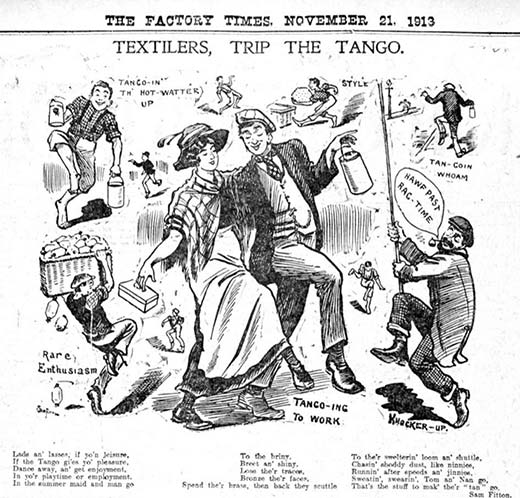
Sam Fitton cartoon
The importance of these cartoons for me is that they are a visual representation of the issues that dominated workers' lives in these years, and are a unique resource. I don't think any other industry has anything similar. Although I knew about these cartoons from the 1970s, I did not begin using them until the 1990s when I realised that I was neglecting one of the most original resources for the industry.
I organised an exhibition on cotton workers at the People's History Museum with Terry and began to appreciate what a wonderful resource they were for telling the history of over half a million workers and their families. The cartoons were also very popular with my students who enjoyed the humour they brought to my teaching.
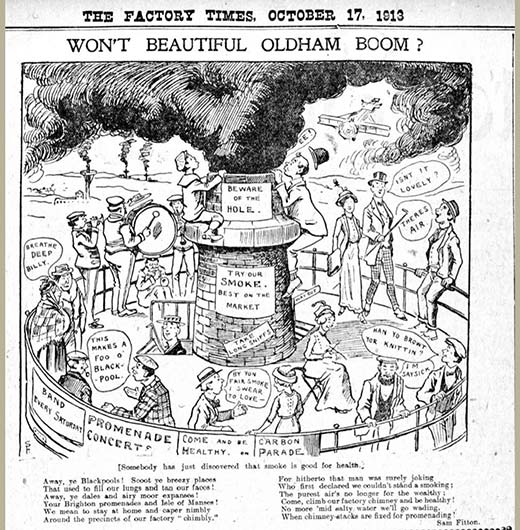
Sam Fitton cartoon
Many local people will recall Lesley. I think she had just retired when she contracted cancer?
I was married to Lesley for over 40 years and there will be many people in Hebden Bridge who will remember her. Sadly she died from pancreatic cancer in 2010 having retired in 2004. She had a lot of wonderful friends in Hebden Bridge, Bradford and Leeds as well as two devoted sons and three lovely siblings.
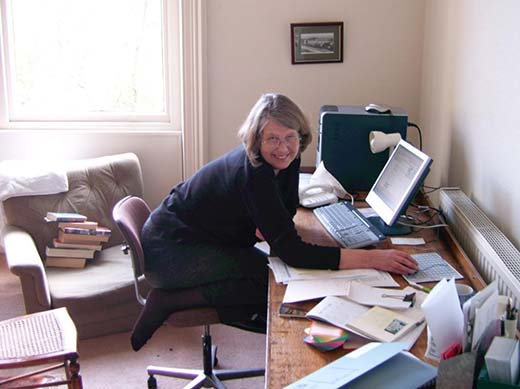
Lesley Fowler
I still quote her and one of my favourite quotes is her remark to me as we went on holiday to celebrate our fortieth wedding anniversary. She turned to me and said, "It's my wedding anniversary. Most people go to Paris. I'm going to Morecambe!"
What's the good and the bad of living in Hebden Bridge?
I enjoy living in Hebden Bridge. It's a friendly town and I like the train and bus services in the town as I do not drive. I live in Old Town, a lovely village with a Post Office, shop, café, an outstanding School and a community centre, all of which help to create a thriving community. It also has a Parish Council! The only downside of Hebden Bridgeis that it is a long way from the sea but that's the price of living on the Pennines!
How did lockdown affect you?
I survived the pandemic because in the year of the anniversary of Peterloo in 2019, I met Jenny, and we locked down together and walked together. It was on one of our walks above Oxenhope that we met a gamekeeper who informed us, rather threateningly, "You shouldn't be walking up here. Boris has said so!" Despite the gun he was carrying, we ignored both him and Boris (although not the lockdown rules), and continued our walk. We met through The Guardian, which is also closely associated with Peterloo and, though we live in different parts of Old Town, we remain partners.
I also researched Lloyd George and Spanish Flu for a talk, an obvious response of an historian to a pandemic!
Not long ago, I saw your talk and slide show about Manchester's industrial history. It was a packed audience. Are you still heavily involved in historical research and talking to audiences?
I continue to study history and have given talks to the local history society and am working on one on the opening of the Trades Club 1924-1925. We have a very active local history society in Hebden Bridge, and I enjoy their meetings. I organise the Social History Group for the Todmorden U3A which is also a pleasure.
I continue to research labour and textile history but following local themes. I am also chair of the North West Labour History Society and I am still a Fellow of the Royal Historical Society.
Is there a question you wished I had asked?
I don't think so because you knew Lesley, George. You knew the questions to ask!
Thank you Alan. I owe you a dandelion and burdock.
More HebWeb interviews from George Murphy
If you would like to send a message about this interview or suggest ideas for further interviews, please email George Murphy

